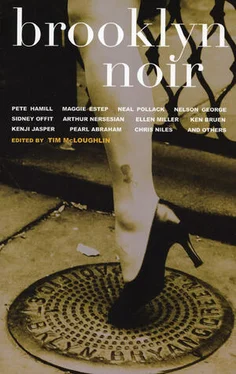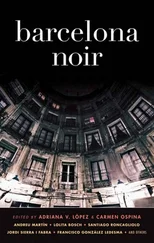Even when school was in session, most of the guys in all the gangs brought their sons to work, where they received their real education. Bridge-building was existence itself, what their fathers before them had done, what their sons after them would probably do. Ironworkers formed multi-generational lines of risk-takers, cold-nerved men bonded together like the high steel it was a life’s assignment to connect. Those burly, balletic men — who took chances only circus acrobats, suicidal souls, Wallendas, or bridgemen would take, who pronounced me cuter than a button , who bear-hugged me till the guacamole would come outa them ears , who gave me quarters just because I was Lefty Tedesky’s girl — were criminals? Plain as day, it couldn’t have been a crime when Chicky Testaverde, who spun cable, brought his fourteen-year-old, Danny, to a job, and it couldn’t have been a crime when a tall ladder caught Danny’s curious eye, and the boy asked, “Can I climb that?”
Chicky replied, in a resigned, benumbed, oh-no-here’s-where-it-all-begins voice, “Awright, but don’t fall.” Could Chicky authoritatively have refused, without Danny laughing in his face as father and son stood right there on a bridge-construction site, where Chicky was now working iron, where both might have been remembering that Chicky’s father, Danny’s grandfather, had worked the Williamsburg Bridge, lifting steel beams with derricks pulled by horses?
Danny climbed that ladder higher and higher, until he stood alone on a slippery top beam — a beam much higher than Chicky had bargained for or would have allowed if Danny had asked — and looked around, taking in the world’s magnitude, and marveled at how extraordinarily far he could see from that height, and instantly decided that ironwork was what he’d someday do. Down at the base, Chicky went all-out ape. “Get down, Danny, you crazy fuck, damn you! You’ll kill yourself up there. And if you die, Danny boy? You know what’ll happen if you die?” Danny smiled down at everyone, smiled what the men called a shit-eating grin. I couldn’t see how eating shit was anything to grin about, but I figured adults knew things I was too young to understand. “If you die,” Chicky screamed at the sky, “I. Will. Fucking. Kill. You.”
Wearing an aw-shucks-I’m-caught-but-I’m-cute mug, Danny climbed down. Everyone, high and low — physically, up on the bridge and down at the base, and professionally, at every station within high steel’s complex system of ranking its men — applauded and cheered. One after another, ironworkers thumped his back hard; sometimes truly to hurt him, because he’d done wrong, he’d gone against his father, and sometimes to congratulate him, as a display of respect, because he’d proven himself bridge-worthy. Danny had demonstrated his passion for and merit within his family’s legacy precisely by defying it in its current incarnation: Chicky. Mostly the men’s back-clapping extended both — contempt and admiration — through the infliction of pain. Just a little pain.
Or a lot. But a lot usually happened at home. Like what they did in public was practice for what they’d do at home. Like they saved a lot up during the day. For later.
Chicky played at grumbling and grousing but couldn’t persuasively beat down his smile — crooked-lipped, prominently lacking some teeth, but jam-packed with filial pride — when he submitted that Danny’s ascent had earned Danny his first beer. Chicky kept a cooler with sodas and beers in his Buick’s trunk on days when the walking bosses weren’t around. He called, “Little Tedesky!” I jumped to attention. “Couldja make yourself useful? Shake a leg? Get my boy here a beer?”
Chicky tossed me his car keys and threw me an approving nod when I caught them no problem. Keds crunching gravel, I ran toward the parking lot, delighted to have a task to fulfill for the men. Danny, overjoyed with his big day’s second distinct launch into masculine adulthood — his illicit, under-age drink, perhaps not his first, as Chicky chose to think — jogged close behind me.
“Today’s your day,” I said, palming the clutch of keys off to him. “You get to do the whole thing.” He unlocked and opened the Buick’s trunk, pried off the cooler’s squeaky Styrofoam lid, retrieved a Rheingold, took a long pull. He offered me a sip.
“Just don’t tell.” Immediately following the initial sip, my arms and legs felt heavy and achy, but they ached good. Another sip, and they ached real good. Another, and I became unsteady. I grabbed Danny’s arm so I wouldn’t skin my knees stumbling to the gravel.
I’d never seen so hairy an arm on someone so young. Up close. With my free hand, I touched the hair on the arm I held hostage, mussing the hair against the whorls of its natural growth configuration, then smoothing it back, as I’d done at home with the wall-to-wall shag. Back and forth, up and down his arm. I was simultaneously lost in and intensely concentrated on the beat, the rhythm of cyclically creating swirling arm-hair chaos and then returning it to tidy normalcy He didn’t stop me. His breath was raggedy. I continued stroking, ruining a pattern, restoring a pattern.
Distantly, Chicky hollered, “I said one beer, not the whole six-pack.” Danny neither responded nor registered hearing his father. Now he had gooseflesh, his soft, young, black arm-hairs standing straight up, a phenomenon I’d later learn was scientifically called piloerection. Chicky shouted, “You writin’ a book or somethin’?” Danny, who got to see his arms and their hair every day, was as transfixed as I was. His breathing steadied, slowed, deepened. Nearly but not quite rupturing my reverie, from afar Chicky yelled, angrily, “Danny? You deaf or just not listening to me today? If I have to come over there…” Wordlessly, Danny stared at my hand gliding along his arm’s shaft. Touching his arm-hair, and the arm-skin underneath, was awfully pleasant and vaguely disturbing, a brand new, unnamable inner commotion that started to spook me. I didn’t want to stop petting him, but I thought I should mention what I’d half-heard. “You’re dad’s mad. You’re in trouble.” Danny didn’t hear me. Chicky bellowed, “Hey, Lefty. People’s gonna think your girl’s the type who hangs around parking lots. See what’s doing over there, will ya?”
My father approached us, boots grinding gravel. Once the beer can came within his eyeshot, his face became a blade of disapproval, features finely sharpened and narrowed. And it cut. I’d done bad. I scrambled for a strategy to fix it.
Perhaps for the first and only blessed time, being a child spared me something. Still young enough to play innocuous tickle-wrestle games, without pulling my hand from Danny’s arm, I wiggled my fingers, ten desperate, panicked worms, deep into Danny’s belly, like I was tickling him, “Cootchie-cootchie-cooo.” Quick-footed, quick-witted Danny followed my lead, doubling over and laughing maniacally, then cootchie-cootchie-coooing my armpits. I shrieked, too, with crazy-person laughter. Although Dad seemed relieved that all Danny was doing was tickling me — the man had no idea that I was doing all the doing, or thought as much — I knew right then that it was officially and indelibly safe to say that I really had a problem, that I was disgusting, that there was poison in my putrefied blood, that I’d been born bad.
A bad seed. A bad egg. Three hundred million bad seeds in a grand hurry toward a head-on collision with one bigger bad egg. The blood-script of a messy but astonishingly idiot-proof recipe for bringing into being a being born bad An accident — a statistically improbable accident — waiting to happen. That would be me.
Читать дальше












